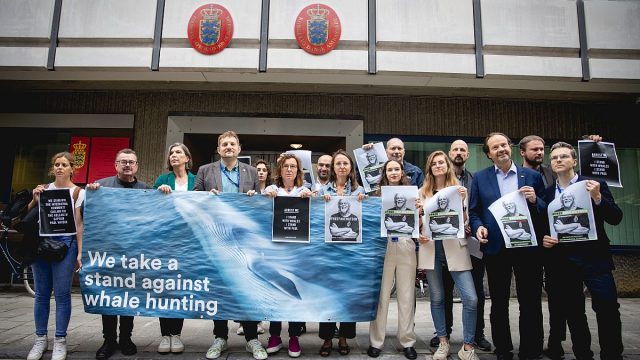An American-Canadian activist was detained in Greenland for a 2010 encounter with a Japanese whaling ship. He is imprisoned in Denmark.
Delegates from the European Parliament protested this Thursday in front of the Danish Embassy in Brussels to demand the release of a detained environmentalist by the Danish Police in Greenland at the beginning of the year at the request of Japan.
European MPs Emma Fourreau (France/The Left) and Lena Schilling (Austria/The Greens), who led the protest, were accompanied by Marc Botenga (Belgium/The Left), Thomas Pellerin-Carlin (France/S&D) and members of the Young European Greens. The group asked the immediate release of marine activist Paul Watson73, founder of the Sea Shepherd Conservation Society, detained while his ship was docked in Nuuk, capital of Greenland, on July 21, by Danish authorities.
The hunt for man was triggered by a 2012 international order issued by Japan, which accused the American-Canadian marine activist of damaging a Japanese whaling ship, obstructing business, and injuring a crew member during an encounter in Antarctic waters in February 2010.
The arrest carried out by Interpol essentially derived from Watson’s efforts to oppose illegal whaling in Antarcticaaccording to the lawmakers, who organized the protest in response to the Greenland High Court’s decision on Wednesday (September 4) to keep Watson in prison 28 more days, until October 2, while a decision on extradition to Japan is studied.
What does Watson face if he is extradited to Japan?
If extradited, Watson would face possible prison sentence of up to 15 years. “Defending nature is not a crime. Paul Watson dedicated his life to protecting marine life and our planet. He defended international law and safeguarded our oceans,” Schilling declared during the protest this Thursday.
“His imprisonment in a European Member State sheds light on increasing repressions that activists face,” he added.
Legislator Fourreau highlighted her work as a politician who works to protect the climate, oceans and biodiversity, and stated that staying silent is not an option: “We cannot accept repression and criminalization of environmental activism“.
“Voices from around the world have already called on Denmark not to extradite Paul Watson,” Fourreau said. “Now, thousands of citizens have their eyes on the Danish government, which could take a political decision that environmentalists will not forget nor will they forgive.”
Whaling is banned in all EU countries, since the bloc has strict conservation laws, such as the 1992 habitat legislation and the Convention on International Trade in Endangered Species of Wild Fauna and Flora, adopted in 1963.
The EU bans trade in whaling products and restricts the capture, killing or disturbance of whales, as the 27-member bloc is governed by the International Convention for the Regulation of Whaling (ICCB), established in 1946 to regulate global whaling.
Outside the bloc, Norway, which is not bound by ICRW rules, has opposed the 1986 international moratorium on commercial whaling, and continues hunting them for commercial purposes since 1993 and capturing around 500 minke whales a year, according to the International Whaling Commission.
The European Commission has not made comments about it.







